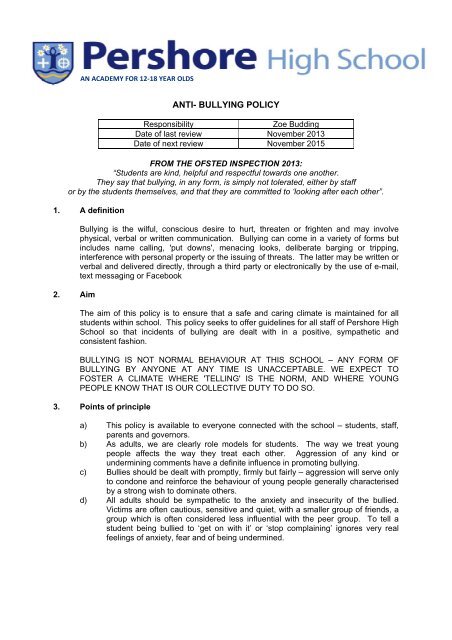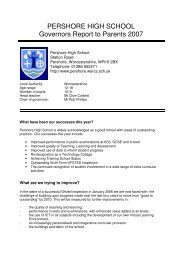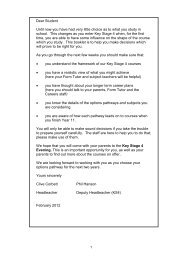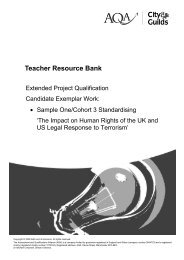ANTI- BULLYING POLICY - Pershore High School
ANTI- BULLYING POLICY - Pershore High School
ANTI- BULLYING POLICY - Pershore High School
Create successful ePaper yourself
Turn your PDF publications into a flip-book with our unique Google optimized e-Paper software.
AN ACADEMY FOR 12‐18 YEAR OLDS<br />
<strong>ANTI</strong>- <strong>BULLYING</strong> <strong>POLICY</strong><br />
Responsibility<br />
Zoe Budding<br />
Date of last review November 2013<br />
Date of next review November 2015<br />
FROM THE OFSTED INSPECTION 2013:<br />
“Students are kind, helpful and respectful towards one another.<br />
They say that bullying, in any form, is simply not tolerated, either by staff<br />
or by the students themselves, and that they are committed to ‘looking after each other”.<br />
1. A definition<br />
2. Aim<br />
Bullying is the wilful, conscious desire to hurt, threaten or frighten and may involve<br />
physical, verbal or written communication. Bullying can come in a variety of forms but<br />
includes name calling, 'put downs', menacing looks, deliberate barging or tripping,<br />
interference with personal property or the issuing of threats. The latter may be written or<br />
verbal and delivered directly, through a third party or electronically by the use of e-mail,<br />
text messaging or Facebook<br />
The aim of this policy is to ensure that a safe and caring climate is maintained for all<br />
students within school. This policy seeks to offer guidelines for all staff of <strong>Pershore</strong> <strong>High</strong><br />
<strong>School</strong> so that incidents of bullying are dealt with in a positive, sympathetic and<br />
consistent fashion.<br />
<strong>BULLYING</strong> IS NOT NORMAL BEHAVIOUR AT THIS SCHOOL – ANY FORM OF<br />
<strong>BULLYING</strong> BY ANYONE AT ANY TIME IS UNACCEPTABLE. WE EXPECT TO<br />
FOSTER A CLIMATE WHERE 'TELLING' IS THE NORM, AND WHERE YOUNG<br />
PEOPLE KNOW THAT IS OUR COLLECTIVE DUTY TO DO SO.<br />
3. Points of principle<br />
a) This policy is available to everyone connected with the school – students, staff,<br />
parents and governors.<br />
b) As adults, we are clearly role models for students. The way we treat young<br />
people affects the way they treat each other. Aggression of any kind or<br />
undermining comments have a definite influence in promoting bullying.<br />
c) Bullies should be dealt with promptly, firmly but fairly – aggression will serve only<br />
to condone and reinforce the behaviour of young people generally characterised<br />
by a strong wish to dominate others.<br />
d) All adults should be sympathetic to the anxiety and insecurity of the bullied.<br />
Victims are often cautious, sensitive and quiet, with a smaller group of friends, a<br />
group which is often considered less influential with the peer group. To tell a<br />
student being bullied to ‘get on with it’ or ‘stop complaining’ ignores very real<br />
feelings of anxiety, fear and of being undermined.
e) All staff are asked to be alert to possible signs of distress in students, such as a<br />
sudden deterioration in the quality of work, disinterest in lessons, increasing<br />
isolation or a desire to hang around teachers. Similarly, parents may notice that<br />
a child becomes unwilling to attend school, stops eating, has money or<br />
possessions go ‘missing’, and comes home regularly with clothes or books<br />
damaged.<br />
f) In this context, all staff should be aware of the needs of our most vulnerable<br />
students and students with special educational needs.<br />
4. Anti-bullying procedures<br />
a) The <strong>School</strong> Rules make it very clear that any bullying is unacceptable and those<br />
who bully will be dealt with and helped to amend their behaviour.<br />
b) Within each lesson, basic ground rules should reinforce the fact that every<br />
student is entitled to be treated with respect. All staff should be aware of<br />
students so that differences in behaviour are noticed.<br />
c) It is equally clear that all students are responsible for bringing to the attention of<br />
staff any incident of bullying, whether it affects them personally or another<br />
student.<br />
d) Lunch and break time duties focus on potential problem areas – this further<br />
underpins the vital necessity of involving all staff in the implementation of the<br />
policy.<br />
e) All curriculum areas have an important role in conveying positive messages<br />
about acceptable behaviour. The PHSE/Citizenship Programme actively<br />
addresses the issues of peer group pressure and bullying.<br />
f) Regular surveys of students across all years will be made to keep check on the<br />
effective implementation of the policy. In addition, bullying will be included as an<br />
agenda item at least once a term for the Student Guidance Team meeting, and<br />
regularly for the <strong>School</strong> Council.<br />
5. The proposed course of action for any occasions of bullying<br />
a) All members of staff must be vigilant within lessons, tutor time and around<br />
school. ‘Put-down’ comments should be discouraged as unacceptable.<br />
b) Staff should be observant of students’ reactions to ‘put downs’. If there is<br />
concern, students should be encouraged to talk, perhaps with a friend’s support.<br />
c) All staff need to be ready to listen if a student wishes to talk, acting calmly but<br />
swiftly to reassure the victim and to offer concrete help.<br />
d) 'Put-down’ comments or name calling or snatching another’s belongings should<br />
be dealt with by the teacher in charge at that time. This kind of behaviour may<br />
be reported to the Form Tutor for recording and maintaining.<br />
Serious or sustained bullying<br />
(for example: continued problems after (4) above, or threatening another student).<br />
a) Report to Head of House or senior management.<br />
b) The relevant member of staff will then interview the bullied student(s) and the<br />
Bully(ies) individually.<br />
c) Should the bullying continue the bullied student should be asked to record their<br />
version of the events in writing.<br />
d) The bully should also be asked to record their version of events in writing.<br />
e) The member of staff dealing with the events should make a brief written record of<br />
their discussion with both parties and any action taken.<br />
f) All written records should include date, time place and a summary of events.
g) The incident and any action taken must also be reported to the Form Tutor,<br />
subject teachers and the Headteacher in the next Year Review.<br />
h) A letter should also be sent to the parents of all students concerned, giving brief<br />
details of the incident and full information about any action taken.<br />
i) Parents should be asked to respond in writing even if they have been into school<br />
to discuss the matter.<br />
j) A formal follow-up 2 to 3 weeks later should be carried out to ascertain that there<br />
has been no further bullying.<br />
The purpose of formal written records is threefold:<br />
<br />
<br />
<br />
To emphasise how seriously bullying is viewed.<br />
To provide evidence if there are further incidents of bullying.<br />
To help the victim to understand that they have been listened to and to help lessen<br />
the fear of further incidents.<br />
6. Sanctions<br />
a) The first step is to expect the bully to be confronted with their behaviour and to<br />
make amends in ways agreed by the victim – this may or may not include them<br />
being brought together to address the problem. This is aimed at reducing the<br />
fear of victims that telling will result in a worsening of the situation.<br />
b) A verbal warning will be issued to the bully in private by Senior Management and<br />
Head of House, a letter sent home and written acknowledgement required from<br />
parents.<br />
c) Detention(s), taking the bully out of circulation during break and lunchtimes.<br />
d) Disciplinary Board.<br />
e) Parents required to attend a formal meeting with Headteacher and Head of<br />
House.<br />
Exclusion procedures.<br />
It may be necessary in extreme cases to involve the Police, but the decision will be at<br />
the discretion of the Headteacher or a Deputy Head teacher and only with the<br />
agreement of a victim and their parents.<br />
Involvement of the Educational Psychologist or other relevant professions to work with<br />
both the bullied and bully may also be necessary at some stage. Counselling sessions<br />
may focus on helping victims to be more assertive and to help bullies to control their<br />
aggression.<br />
»»»«««<br />
External contacts where information, help and guidance may be sought:<br />
o www.childnet.com<br />
o www.digizen.org<br />
o www.thinkuknow.co.uk<br />
o www.bullying.co.uk<br />
o Advisory Centre for Education (ACE) - 020 7354 8321<br />
o Children's Legal Centre - 0845 345 4345<br />
o KIDSCAPE Parents Helpline (Mon-Fri, 10-4) - 0845 1 205 204<br />
o Parentline Plus - 0808 800 2222<br />
o Youth Access - 020 8772 9900<br />
T:\ADMIN\Office\Policies\POLICIES\Bullying.docx
















